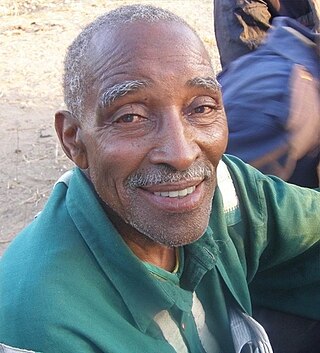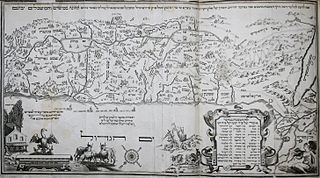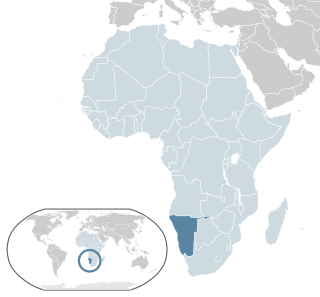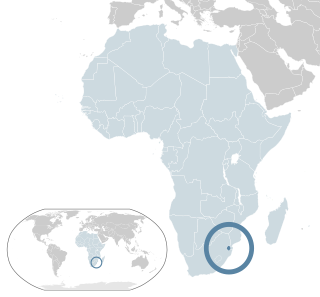
The Lemba, Remba, or Mwenye are an ethnic group which is native to South Africa, Malawi, Mozambique and Zimbabwe of mixed Bantu and Yemeni heritage. Within South Africa, they are particularly concentrated in the Limpopo province and the Mpumalanga province.

Ashkenazi Jews, also known as Ashkenazic Jews or Ashkenazim, constitute a Jewish diaspora population that emerged in the Holy Roman Empire around the end of the first millennium CE. They traditionally spoke Yiddish and largely migrated towards northern and eastern Europe during the late Middle Ages due to persecution. Hebrew was primarily used as a literary and sacred language until its 20th-century revival as a common language in Israel.

SephardicJews, also known as Sephardi Jews or Sephardim, and rarely as Iberian Peninsular Jews, are a Jewish diaspora population associated with the Iberian Peninsula. The term, which is derived from the Hebrew Sepharad, can also refer to the Jews of the Middle East and North Africa, who were also heavily influenced by Sephardic law and customs. Many Iberian Jewish exiled families also later sought refuge in those Jewish communities, resulting in ethnic and cultural integration with those communities over the span of many centuries. The majority of Sephardim live in Israel.

African Jewish communities include:

Maghrebi Jews or North African Jews are an ethnic group of Jews who had traditionally lived in the Maghreb region of North Africa under Arab rule during the Middle Ages. Established Jewish communities had existed in North Africa long before the arrival of Sephardi Jews, expelled from Portugal and Spain. The term Musta'arabi was also used by medieval Jewish authors to refer to Jews who had traditionally lived in the Maghreb. Due to proximity, the term 'Maghrebi Jews' sometimes refers to Egyptian Jews as well, even though there are important cultural differences between the history of Egyptian and Maghrebi Jews. These Jews originating from North Africa constitute the second largest Jewish diaspora group.

Mizrahi Jews, also known as Mizrahim (מִזְרָחִים) or Mizrachi (מִזְרָחִי) and alternatively referred to as Oriental Jews or Edot HaMizrach, are terms used in Israeli discourse to refer to a grouping of Jewish communities that lived in the Muslim world. Mizrahi is a political sociological term that was coined with the creation of the State of Israel. It translates as "Easterner" in Hebrew. The term Mizrahi is almost exclusively applied to descendants of Jewish communities from North Africa and Asia; in this classification are the descendants of Mashriqi Jews who had lived in Middle Eastern countries, such as Yemenite Jews, Iranian Jews, Kurdish Jews, Turkish Jews, Egyptian Jews, Syrian Jews, Lebanese Jews, Iraqi Jews, Jordanian Jews, Saudi Arabian Jews, Emirati Jews, Kuwaiti Jews, Bahraini Jews, Qatari Jews, Omani Jews; as well as the descendants of Maghrebi Jews who had lived in North African countries, such as Algerian Jews, Libyan Jews, Moroccan Jews, and Tunisian Jews. These various Jewish communities were first officially grouped into a singular identifiable division during World War II, when they were distinctly outlined in the One Million Plan of the Jewish Agency for Israel, which detailed the methods by which Jews of the diaspora were to be returned to the Land of Israel after the Holocaust.

The history of Jews in Algeria goes back to Antiquity, although it is not possible to trace with any certainty the time and circumstances of the arrival of the first Jews in what is now Algeria. In any case, several waves of immigration helped to increase the population. There may have been Jews in Carthage and present-day Algeria before the Roman conquest, but the development of Jewish communities is linked to the Roman presence. Jewish revolts in Israel and Cyrenaica in the 1st and 2nd centuries certainly led to the arrival of Jewish immigrants from these regions. The vast majority of scholarly sources reject the notion that there were any large-scale conversions of Berbers to Judaism.
Black Hebrew Israelites are a new religious movement claiming that African Americans are descendants of the ancient Israelites. Some sub-groups believe that Native and Latin Americans are descendants of the Israelites as well. Black Hebrew Israelites combine elements to their teaching from a wide range of sources to varying degrees. Black Hebrew Israelites incorporate certain aspects of the religious beliefs and practices of both Christianity and Judaism, though they have created their own interpretation of the Bible, and other influences include Freemasonry and New Thought, for example. Many choose to identify as Hebrew Israelites or Black Hebrews rather than Jews in order to indicate their claimed historic connections.
South African Jews, whether by culture, ethnicity, or religion, form the twelfth largest Jewish community in the world, and the largest on the African continent. As of 2020, the Kaplan Centre at the University of Cape Town estimates 52,300 Jews in the country. The South African Jewish Board of Deputies estimates that the figure is closer to 75,000.
Italian Jews or Roman Jews can be used in a broad sense to mean all Jews living in or with roots in Italy, or, in a narrower sense, to mean the Italkim, an ancient community living in Italy since the Ancient Roman era, who use the Italian liturgy as distinct from those Jewish communities in Italy dating from medieval or modern times who use the Sephardic liturgy or the Nusach Ashkenaz.

The Ten Lost Tribes were the ten of the Twelve Tribes of Israel that were said to have been exiled from the Kingdom of Israel after its conquest by the Neo-Assyrian Empire c. 722 BCE. These are the tribes of Reuben, Simeon, Dan, Naphtali, Gad, Asher, Issachar, Zebulun, Manasseh, and Ephraim — all but Judah, Benjamin, and some members of the priestly Tribe of Levi, which did not have its own territory.

Jewish views on slavery are varied both religiously and historically. Judaism's ancient and medieval religious texts contain numerous laws governing the ownership and treatment of slaves. Texts that contain such regulations include the Hebrew Bible, the Talmud, the 12th-century Mishneh Torah by Rabbi Moses ben Maimon, also known as Maimonides, and the 16th-century Shulchan Aruch by Rabbi Yosef Karo.
Black Jews are people who are both Black and Jewish.

The history of the Jews in Zimbabwe reaches back over one century. Present-day Zimbabwe was formerly known as Southern Rhodesia and later as Rhodesia.

The Jews or Jewish people are an ethnoreligious group and nation originating from the Israelites of the ancient Near East, and whose traditional religion is Judaism. Jewish ethnicity, religion, and community are highly interrelated, as Judaism is an ethnic religion, although not all ethnic Jews practice it. Despite this, religious Jews regard individuals who have formally converted to Judaism as part of the community.
Genetic studies of Jews are part of the population genetics discipline and are used to analyze the ancestry of Jewish populations, complementing research in other fields such as history, linguistics, archaeology, and paleontology. These studies investigate the origins of various Jewish ethnic divisions. In particular, they examine whether there is a common genetic heritage among them. The medical genetics of Jews are studied for population-specific diseases.

The history of the Jews in Namibia goes back a little more than one and a half centuries. Non-existent in Namibia before the 19th century, Jews played an important if minor role in the history of Namibia since that point in time, despite their continuous small population. The most famous Namibian Jew was "businessman, philanthropist and Jewish communal leader" Harold Pupkewitz (1915–2012).

The history of the Jews in Zambia goes back to the early 1900s. Jews were always a small community with a notable role in Zambian history. The history of the Jews in Zambia dates to 1901 when it was still under British Colonial rule. Northern Rhodesia was colonized in the 1890s by the British South Africa Company, otherwise known as BSAC. Initially, Northern Rhodesia was split into North-eastern and North-western Rhodesia. However, the BSAC united them in 1911 to form Northern Rhodesia, which has its capital in Livingstone, near Victoria Falls. Among the population of 1 million people, there were 1,500 white residents in Northern Rhodesia, of whom many were the Jewish settlers. Northern Rhodesia became under British Colonial Rule partially so that the British Government could increase the number of white individuals and settlers in the country, which would contribute to a wider strategy to increase the influence that the British has between Kenya and South Africa. The Jewish settlers were one of the dominant ethnic groups and became highly involved in local politics, with prominent Jewish figures driving the push for Zambian independence and African nationalist rhetoric. Northern Rhodesia’s fertile land, World War II, and independence from the British Colonial rule all had a profound impact on both immigration and emigration of Jewish refugees. The Jewish diaspora introduced trade and commerce into the region in both regional and urban areas through cattle trading, ranching, mining, communication networks, storefronts, transport, and butchery, amongst others. The Jewish settlers, whether they are Jewish through origin, birth, marriage, or confession, all formed a small, yet strong community. The Jews in Zambia were a Jewish diaspora cultural and religious settler minority group, which raises concerns about the notion of who is the coloniser, who is the colonised, who is the victim and who is the oppressor. This deems that it can be studied through a postcolonial framework. Following Zambia's independence in 1964, there was a large exodus of Jews and white individuals from the country. In 2022, there remains less than fifty Jews in Zambia.After existence for 130 years as of 15 June 2024 the total of Jews in Zambia numbers 11

Jews have inhabited the Southern United States since the late 1600s and have contributed to the vibrant cultural and historical legacy of the South in many ways. Although the United States' Jewish population is more often thought to be concentrated in Northern cities, such as New York, thousands of Jewish immigrants chose to settle in the more rural Southern United States forming tight-knit religious communities and creating a unique cultural identity. Jewish immigrants came to the South from various countries, backgrounds and religious traditions within Judaism. Major Jewish communities include Memphis, Tennessee; Houston, Texas; Savannah, Georgia; Charleston, South Carolina; Charlottesville, Virginia; and Wilmington, North Carolina. Jews participated in many important events in Southern history, such as the Civil War, the World Wars, and the civil rights movement.

The history of the Jews of Eswatini, formerly Swaziland.